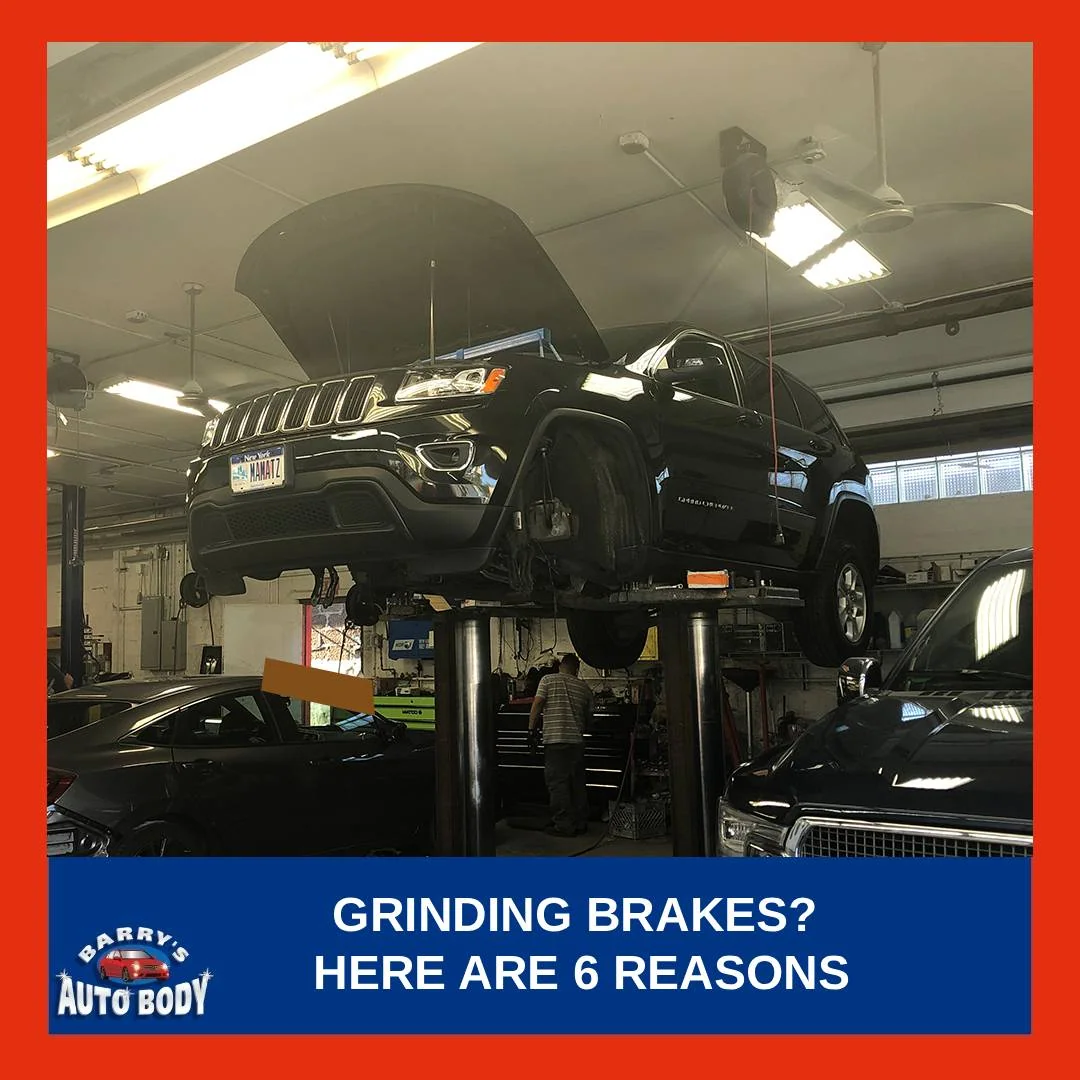You press the brake pedal, expecting a smooth, quiet stop, but instead, you hear a sharp grinding, scraping, or metal-on-metal noise. It might only last a second, or it might happen every time you slow down. Many drivers hope it’s just dust or temporary debris, but grinding sounds almost always mean something in your braking system needs attention.
Ignoring brake noises can lead to safety risks, higher repair costs, and unpredictable stopping power. This guide breaks down what grinding noises might mean, what causes them, and what steps you can take to keep your braking system in good condition.
Why Brakes Make Noise
Your braking system works by generating friction between the brake pads and the rotors, slowing your vehicle. Because this system relies heavily on metal components under high heat and pressure, unusual noises often happen when parts are worn, misaligned, or contaminated.
Reasons Noise Might Occur:
- Moisture causing temporary surface rust.
- Debris caught between the pad and rotor.
- Metal-on-metal contact from worn pads.
- Uneven braking pressure caused by caliper issues.
Most light noises disappear quickly, but persistent grinding can signal more serious wear or even component failure.
Common Causes of Grinding Brake Noises
Worn Brake Pads
This is the most common cause of grinding. Brake pads are designed to gradually wear down over time. But once they’re too thin, the metal backing plate might rub directly against the rotor.
Symptoms:
- Loud grinding when pressing the brake pedal.
- Longer stopping distances.
- High-pitched squeals before grinding begins.
Why It Matters:
Metal-to-metal friction can damage rotors, making repairs far more expensive.
Actionable Steps:
- Check pad thickness through wheel spokes (if visible).
- Replace brake pads once they look thin or uneven.
- Consider scheduling brake inspections every 10,000–15,000 miles.
Damaged or Warped Rotors
Rotors experience extreme heat, especially during repeated braking. Over time, they can warp, crack, or wear unevenly.
Symptoms:
- Grinding or scraping sound.
- Pulsing the brake pedal while stopping.
- Vibration through the steering wheel.
Why It Matters:
Warped rotors reduce contact between pads and rotors, decreasing braking effectiveness.
Actionable Steps:
- If vibration is mild, resurfacing might help.
- Deep grooves or warping usually require rotor replacement.
Debris Between Pad and Rotor
A small rock or piece of rust can get lodged between the braking components.
Symptoms:
- Sudden grinding sound that changes with wheel rotation.
- Noise might appear intermittently.
Why It Matters:
Debris can scratch or score the rotor surface if not removed.
Actionable Steps:
- Safely inspect the rotor area for visible debris.
- If noise continues, professional cleaning might be a good option.
Sticking Calipers
Calipers press the brake pads against the rotors. If a caliper sticks, the pad may drag continuously.
Symptoms:
- Grinding or squealing even when not braking.
- Burning smell near a wheel.
- Rapid or uneven pad wear.
Why It Matters:
A sticking caliper can overheat components and cause brake failure.
Actionable Steps:
- Avoid long drives until inspected.
- Have calipers cleaned, lubricated, or replaced if needed.
Lack of Lubrication on Brake Components
Brake hardware, such as caliper slides and guide pins, needs proper lubrication.
Symptoms:
- Uneven braking.
- Occasional grinding or clunking.
Why It Matters:
Insufficient lubrication can cause misalignment or uneven wear.
Actionable Steps:
- Brake servicing typically includes lubricating required components.
- Seal moisture-prone areas to prevent rusting.
Low-Quality or Faulty Brake Parts
Cheap or worn-out aftermarket parts might cause grinding.
Why It Matters:
Low-quality pads often wear faster or produce unwanted noise.
Actionable Steps:
- Choose OEM or certified pads and rotors.
- Replace components as a set for balanced performance.
When Grinding Noise Means Urgent Attention
Grinding can point to urgent braking issues. Knowing when to act quickly helps maintain safety.
Immediate Warning Signs:
- Grinding continues even after releasing the brake.
- The brake pedal feels soft, spongy, or sinks lower than usual.
- A burning smell coming from the wheels.
- Brake warning light on the dashboard.
These signs might indicate severe pad wear, rotor damage, or failing hydraulic components.
The Cost of Ignoring Brake Noises
Ignoring grinding noises can lead to:
1. Rotor Damage
When pads wear out completely, rotors can be deeply scored.
2. Caliper Failure
Overheated calipers might seize, requiring replacement.
3. Increased Stopping Distance
Reduced braking ability might compromise safety.
4. Higher Repair Costs
A simple pad replacement might escalate into:
- New rotors
- New calipers
- ABS issues
How to Safely Check Your Brakes at Home
Step-by-Step Guide:
- Park on flat, safe ground and engage the parking brake.
- Listen to where the noise comes from, front or rear.
- Look through wheel spokes to estimate pad thickness.
- Check for excessive brake dust or metal shavings.
- Feel for vibrations during light braking.
Safety Note:
Avoid removing wheels or attempting repairs without experience—braking systems are safety-critical.
When to Seek Professional Help
You should consider a professional brake inspection if:
- Grinding lasts more than a day or two.
- You feel vibrations or pulling.
- You smell burning or notice smoke.
- Brake fluid is low.
A technician can measure pad thickness, inspect rotors, check calipers, and test hydraulic performance.
How Barry’s Auto Body Can Help
Barry’s Auto Body offers:
Professional Brake Services:
- Brake pad replacement
- Rotor resurfacing or replacement
- Caliper diagnostics
- Brake fluid flushes
- ABS warning diagnostics
Their ASE-certified technicians can help identify noise sources, recommend appropriate repair options, and ensure your braking system functions smoothly.
Grinding noises during braking might seem minor at first, but they can be clear indicators of deeper issues such as rotor damage, worn pads, or malfunctioning calipers. Early detection can help prevent costly repairs and maintain safe stopping performance.
If your brakes are grinding, squealing, or behaving in an unusual way, consider reaching out to Barry’s Auto Body for an inspection. A timely check might prevent larger problems and help restore confidence in your vehicle’s braking system.

